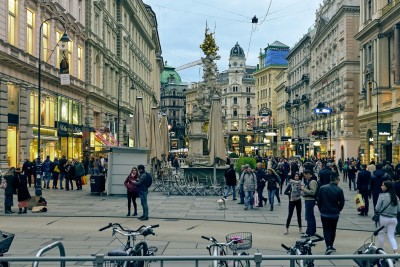Vienna Once Again Named the World's Most Liveable City
Vienna has done it again: for the third time in a row, the Austrian capital has been named the most liveable city in the world by the British "Economist" group. In the annual "Global Liveability Ranking", Vienna beat 172 other cities to take the top spot once again.
 For the third time in a row, Vienna has been named the most liveable city in the world by the British Economist in its annual Global Liveability Ranking. / Picture: © Pedro Szekely from Los Angeles, USA, CC BY-SA 2.0 , via Wikimedia Commons
For the third time in a row, Vienna has been named the most liveable city in the world by the British Economist in its annual Global Liveability Ranking. / Picture: © Pedro Szekely from Los Angeles, USA, CC BY-SA 2.0 , via Wikimedia Commons
According to the ranking, the decisive factors for the top position were above all the full score in stability, healthcare system, education, and infrastructure. These criteria contribute significantly to the high quality of life in the city. Copenhagen, Zurich, and Melbourne followed in the rankings. Geneva was another European city to make it into the top 5.
Mayor Michael Ludwig (SPÖ) was delighted with the award. "It fills us with pride that our achievements have once again been recognized and awarded internationally," said Ludwig. He emphasized that this result was no coincidence, but the result of the hard-working Viennese population and the right political decisions. "It is an award for all Viennese as well as for the achievements of the City of Vienna and its employees," added the Mayor.
Vienna's renewed success in the "Global Liveability Ranking" underlines the high quality of life that the city offers its residents. In addition to the excellent ratings in stability, health, education, and infrastructure, the commitment of the city administration and the Viennese population also contribute to the city's positive international reputation.
The top 10 of the ranking is completed by other cities such as Calgary, Sydney, Vancouver, Osaka, and Auckland. Vienna thus remains a shining example of the quality of life and urban development at the highest level.
Criteria of the "Global Liveability Ranking
The "Global Liveability Ranking" by the British "Economist" evaluates the quality of life in cities worldwide based on key criteria. These include stability, healthcare system, education, infrastructure, and culture and environment.
Stability is crucial for a secure and predictable environment, while the healthcare system refers to the quality and availability of medical services. Education is assessed based on the availability and quality of educational facilities, from elementary school to university. Infrastructure, including public transportation, housing, water and energy supply, and road network, is also considered. Finally, culture and environment are assessed based on climate, leisure facilities, cultural facilities, and environmental conditions.
The ranking is based on data analysis, expert opinions, and surveys to provide an objective and comprehensive picture of the quality of life in cities. The city with the highest overall score is recognized as the most liveable city.



